七英学案24
七年级英语冀教版导学案下lesson24导学案
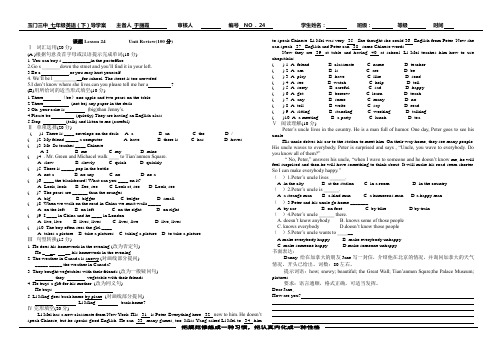
玉门三中 七年级英语(下)导学案 主备人 于丽霞 审核人 编号 NO . 24 学生姓名: 班级: 等级 时间把规范修炼成一种习惯,把认真内化成一种性格 课题Lesson 24 Unit Review(100分)Ⅰ. 词汇运用(20分) (A.)根据句意及首字母或汉语提示完成单词(10分) 1. You can buy s ___________in the postoffice. 2.Go s _______down the street and you’ll find it in your left. 3.Be c ,or you may hurt yourself. 4. We’ll be l ___________for school. The street is too crowded 5.I don’t know where she lives.can you please tell me her a ? (B)用所给词的适当形式填空(10分) 1.There (be )one apple and two pears on the table. 2.There (not be) any paper in the desk. 3.Oh ,your cake is (big)than Jenny’s. 4.Please be (quietly).They are having an English class. 5.Stop (talk) and listen to me (careful). Ⅱ. 单项选择(20分) ( )1. There is ____ envelope on the desk. A. a B. an C. the D. / ( )2. My friend _____ a computer. A. have B. there is C. has D. haves ( )3. Mr. Su teaches ____ Chinese. A. I B. me C. my D. mine ( )4. . Mr. Green and Michacel walk ____ to Tian’anmen Square. A. slow B. slowly C. quick D. quickly ( )5. There is _____ pop in the bottle . A. not a B. no any C. no D. no a ( )6. ____ the blackboard! What can you ____ on it? A. Look, look B. See, see C. Look at, see D. Look, see ( )7. The pears are ______ than the oranges. A. big B. bigger C. beiger D. small ( )8. When we walk on the road in China we must walk _____. A. on the left B. on left C. on the right D. on right ( )9. I ____ in China and he ____ in London. A. live, live B. lives, lives C. lives, live D. live, lives ( )10. The boy often sees the girl ____ .A. takes a pictureB. take a picturesC. taking a pictureD. to take a pictureⅢ. 句型转换(15分) 1. He does his homework in the evening (改为否定句). He _ __ __ his homework in the evening.2. The weather in Canada is snowy (对画线部分提问)._____ _____ the weather in Canada?3. They bought vegetables with their friends.(改为一般疑问句) they vegetable with their friends.4. He buys a gift for his mother. (改为同义句) He buys5. Li Ming goes back home by plane. (对画线部分提问) Li Ming back home? Ⅳ.完形填空(20分) Li Mei has a new classmate from New York. His 31 is Peter. Everything here 32 new to him. He doesn’t speak Chinese, but he speaks good English. He can 33 many games, too. Miss Yang asked Li Mei to 34 himto speak Chinese. Li Mei was very 35 . She thought she could 36 English from Peter. Now she can speak 37 English and Peter can 38 some Chinese words. Now they are 39 at table and having 40 at school. Li Mei teaches him how to use chopsticks. ( ) 1. A. friend B. classmate C. name D. teacher ( ) 2. A. am B. is C. are D. be ( ) 3. A. play B. have C. like D. send ( ) 4. A. see B. watch C. help D. tell ( ) 5. A. sorry B. careful C. sad D. happy ( ) 6. A. get B. borrow C. learn D. teach ( ) 7. A. any B. some C. many D. no ( ) 8. A. tell B. write C. say D. read ( ) 9. A. sitting B. standing C. working D. talking ( )10. A. a meeting B. a party C. lunch D. tea Ⅴ. 阅读理解(10分) Peter’s uncle lives in the country. He is a man full of humor. One day, Peter goes to see his uncle. His uncle drives his car to the station to meet him. On their way home, they see many people. His uncle waves to everybody. Peter is surprised and says , “Uncle, you wave to everybody. Do you know all of them?” “ No, Peter,” answers his uncle, “when I wave to someone and he doesn’t know me, he will feel surprised and then he will have something to think about. It will make his road seem shorter. So I can make everybody happy.” ( )1.Peter’s uncle lives ______. A. in the city B. at the station C. in a room D. in the country ( )2.Peter’s uncle is ______. A. a strange man B. a kind man C. a humorous man D.a happy man ( )3.Peter and his uncle go home _______. A. by car B. on foot C. by bike D.by train ( )4.Peter’s uncle ______ there. A. doesn’t know anybody B. knows some of those people C. knows everybody D.doesn’t know those people ( )5.Peter’s uncle wants to ______. A.make everybody happy B. make everybody unhappy C. make someone happy D.make someone unhappy 书面表达: Danny 给在加拿大的朋友Jane 写一封信,介绍他在北京的情况,并询问加拿大的天气情况。
冀教版七年级英语上册Unit4Lesson24教学设计
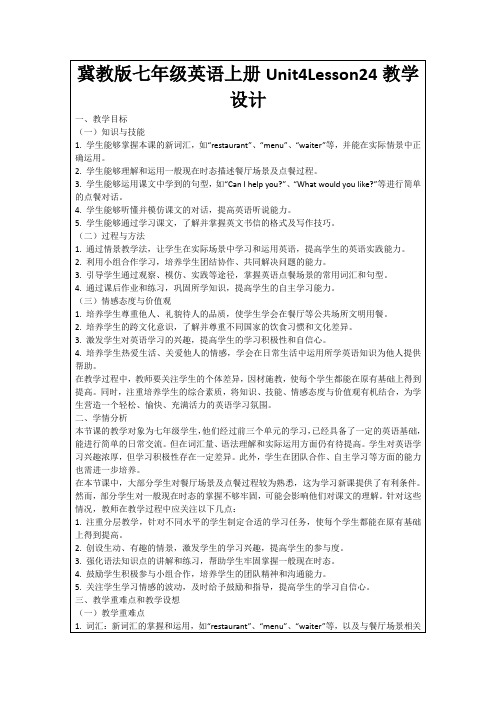
6.情感教育:在教学过程中,注重培养学生的跨文化意识,尊重和理解不同的饮食习惯。
-教学活动:课堂讨论,让学生分享自己了解的不同国家的饮食文化。
7.教学评价:采用形成性评价和终结性评价相结合的方式,全面评估学生的学习效果。
-教学活动:课堂表现、作业完成情况、小组合作成果展示等作为评价依据。
4.学生能够听懂并模仿课文的对话,提高英语听说能力。
5.学生能够通过学习课文,了解并掌握英文书信的格式及写作技巧。
(二)过程与方法
1.通过情景教学法,让学生在实际场景中学习和运用英语,提高学生的英语实践能力。
2.利用小组合作学习,培养学生团结协作、共同解决问题的能力。
3.引导学生通过观察、模仿、实践等途径,掌握英语点餐场景的常用词汇和句型。
2.语法:一般现在时态的运用,特别是在描述餐厅场景和点餐过程中的正确使用。
3.对话:能够流利地运用课文中学到的句型进行点餐对话,如“Can I help you?”、“What would you like?”等。
4.写作:掌握英文书信的格式及写作技巧,能够独立撰写一封点餐信。
(二)教学设想
1.创设情境:通过多媒体展示餐厅的场景,让学生在真实语境中感知和学习英语,提高语言实践能力。
(四)课堂练习
1.教学活动:设计多样化的练习,让学生巩固一般现在时态和餐厅点餐场景的英语表达。
2.教学策略:采用练习法,通过填空、选择、改错等形式,帮助学生巩固所学知识。
3.教学步骤:
a.设计填空题,让学生运用一般现在时态完成句子。
b.设计选择题,测试学生对餐厅场景词汇和句型的掌握程度。
c.设计改错题,让学生找出句子中的错误,并进行修改,提高语法准确性。
冀教版英语七年级上册Unit4Lesson24教学设计
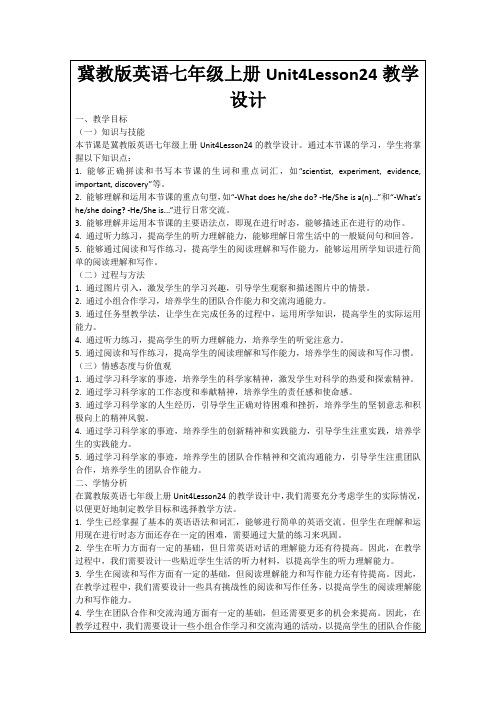
(二)过程与方法
1.通过图片引入,激发学生的学习兴趣,引导学生观察和描述图片中的情景。
2.通过小组合作学习,培养学生的团队合作能力和交流沟通能力。
3.通过任务型教学法,让学生在完成任务的过程中,运用所学知识,提高学生的实际运用能力。
6.激励评价:在教学过程中,适时给予学生鼓励和评价,提高学生的学习积极性和自信心。
四、教学内容与过程
(一)导入新课
本节课的导入环节,我设计了一个科学家的工作场景展示。我会向学生展示一些著名科学家的照片,并简要介绍他们的工作和贡献。通过展示科学家的工作场景,激发学生对科学家的好奇心,引导学生关注科学家的工作和贡献。同时,我会提出问题:“你们知道这些科学家正在做什么吗?”让学生思考并猜测科学家的工作内容,从而引出本节课的主题。
(三)学生小组讨论
在学生小组讨论的环节,我会将学生分成小组,并设计一些与科学家工作相关的情境任务。例如,我会让学生小组讨论科学家是如何进行实验的,他们需要收集哪些证据,以及他们的发现对人们有什么重要性。学生可以通过查阅教材和参考资料,进行讨论和交流,从而加深对科学家工作的理解。
(四)课堂练习
在课堂练习的环节,我会设计一些听力练习和阅读写作练习,以巩固学生所学知识。例如,我会播放一些日常英语对话的录音,让学生听后回答问题,提高学生的听力理解能力。同时,我会让学生阅读一些关于科学家事迹的文章,并回答相关问题,提高学生的阅读理解能力。此外,我还会让学生进行一些写作练习,如写一篇关于他们最喜欢的科学家的文章,从而提高学生的写作能力。
5.实践性作业:让学生观察身边的科学家或准科学家,了解他们的日常工作,并记录下来,以培养学生的观察力和实践能力。
新目标英语七年级下全册学案(24页).docx
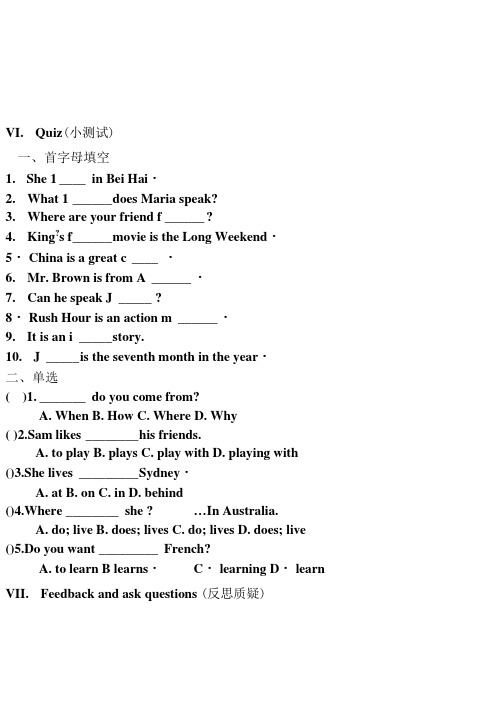
VI.Quiz(小测试)一、首字母填空1.She 1 ____ in Bei Hai・2.What 1 ______ d oes Maria speak?3.Where are your friend f ______ ?4.King?s f ______ m ovie is the Long Weekend・5・ China is a great c ____ ・6.Mr. Brown is from A ______ ・7.Can he speak J _____ ?8・ Rush Hour is an action m ______ ・9.It is an i _____ s tory.10.J _____ i s the seventh month in the year・二、单选( )1. _______ do you come from?A. WhenB. HowC. WhereD. Why( )2.Sam likes ________ h is friends.A. to playB. playsC. play withD. playing with ()3.She lives _________ S ydney・A. atB. onC. inD. behind()4.Where ________ she ? …In Australia.A. do; liveB. does; livesC. do; livesD. does; live ()5.Do you want _________ French?A. to learn B learns・C・ learning D・ learn VII.Feedback and ask questions (反思质疑)English learning planUnit One Where9s your pen pal from ?Section AI.Learning Aims (学习目标)1・Words : Canada,France,Japan,the United States,Australia,Singapore,the United Kingdom,Sydney,New York,Pairs,Toronto,Tokyo,French,Japanese,pal,country,live, language 2・ Phrades : talk about; be from/come from ; pen pal; what language ;speak English3・ Important sentences : l)Where,s your pen pal from ?2) Where does he live ?3) What language does he speak ?II.Learning methods (学习方法)Speaking and ListeningIII.Independent study (自主学习)A.Finish section A (la)B.翻译短语:]•笔友 ____________________ 2 •美国_________________________ 3•英国___________________ 4 •来自于_______________________5.______________________ 纽约___________________________6.住在东京______________________7.______________________ 什么语言_______________________ &说英语________________________nguage points :A: Where is your pen pal from ? = Where does your pen pal from ?B: She is from Japan ・=She comes from Japan ・IV.Cooperate and explore with the students.(合作探究,师生互动)V.Summary (小结)A .France B. Mexico C. Spanish D. Korea()4.—Where does she _______ ? -She lives in Beijing・A. fromB. live , inC. livesD. live( )5. My new pen pal ______ Canada and speaks English・A・ come from B is from C・ live D・ live in()6.—Is that your new friend? - _________ ・A. Yes, she is.B. No, he isn,tC. Yes, it isD. No, that isn,t()7.Does she have _______ brothers _____ sisters?A. some, andB. any, andC. some ,orD.ANY, OR()8.She likes ________ to the movies and _______ b asketball・A・ go to play B・ going, playingC. to go, playingD. going ,to play()9. Do you _________ Australia?A. speak B・ from C・ live D・ come from()lO.London is the capital of _______ ・A. the United StatesB. the United KingdomC. AustraliaD. Japan 二、句型转换(10分):1.Where is your pen pal from?= Where ___ your pen pal _______ from?2.Where does he live ? = ___ ________ does he live _____ ?3.Whaf s her favorite subject?=What subject ____________ l ike ___ ?4.They speak English.(就划线部分提问)________________ do they speak?VII. Feedback and ask questions (反思质疑)English learning planUnit One Where9s your pen pal from ?Section B1.Learning Aims (学习目标)1・ Words: Japanese, French, country, Toronto, Canada, the United Kingdom, Australia, world, pen pal,any, dislike, from, country,people, language2.Phrases: be...from=com from, live in ・・・,live here/there3・ Important sentences:(D- Is that from your new pen pal? -Yes, it is.(2) 1 live in Toronto ,Canada, and I want a pen pal in China・(3) 1 think China is a very interesting country・⑷一Where does he live? —He lives in Mexico City.II.Learning methods (学习方法)Speaking and ListeningIII.Independent study (自主学习)一、英汉词组互译(10分):1•来自___________ 6. the United Kingdom _________________2•桃法语__________ 7. the United States ____________________3施最喜欢的科目 __________ 8. tell me about yourself _________4•一由儿日语____________ 9. in Australia _________________5•在周末__________________ 10. New York ___________________IV.Cooperate and explore with the students.(合作探究,师生互动)V.Summary (小结)VI.Quiz(小测试)一、选择填空(20分):()1.— ___ is this pencil case ______ ? —If s from the USA.A. What, fromB. What color, /C. Where, fromD. Where, /()2. —Where are Emma?s parents from? - _______ from Japan・A. If sB. These,reC. She,sD. Theyle()3.—What language does your new pen pal speak? ________ ・VI. Quiz(小测试)一、翻译短语.1.邮局2.在这附近4.公用电话5.在…-对过7.在…前面&在…和…之间10.在第五大街二、根据汉语完成句子.1•请问,邮局在哪里?, is the 3.在中心大街6 •在格林大街9.紧挨着2.在这附近有银行吗?there a ? 3.公用电话在图书馆对过.The is the 4.公用电话在邮局和图书馆之间.The is the and the 5.超市在第五大街.The is6.餐馆在邮局的后面.The is the7.公园在银行的前面.The is theEnglish learning planUnit Two Where ?s the post office ?Section AI. Learning Aims (学习目标)l. Words:post,office,restaurant,librarysupermarket,bank,park,pay,street,center,mail,near,bridge,across,between,front,behind2・ Phrades : post office, across from, Excuse me, In front of, next to, turnleft,turn right3・ Important sentences : Is there a supermarket? —Yes, there is./No,there isn ,t ・-Ifs on Center Street ・ -If s across from the bank.-Where ?s the pay phone? -Ifs next to the post office・-Where^ the library? -Ifs between the restaurant and the supermarket. II. Learning methods (学习方法):Speaking and ListeningIII. Independent study (自主学习)A. Finish section A (la )B. 翻译短语:1 •邮局 __________________2 •在一对面 ____________________3 •在…前面 _______________4 •在…后面 ____________________5 •投币式电话 ____________6 •紧挨着 ______________________7 •介于两者之间 ___________8 •这附近 ______________________nguage points :Where 9s the park? --It's on Center Street.—Where 5s the hotel? —It's across from the bank.-Where 5 s the pay phone? —It 9s next to the post office.—Where 9s the library? —It's between the restaurant and the supermarket.-Where ?s the park? -Where ?s the hotel?IV.Cooperate and explore with the students.(合作探究,师生互动)V.Summary (小结)VI.Quiz(小测试)一、翻译词组:1. _______________ 欢迎到-…______2.散步_______3.在对面4._个有趣的花园___________5.-----的开端________________6. _______________ 下周日____________7.去-…的路_______ &坐出租车 _________________9.穿越第六大街___________ 10.旅途愉快____________二.根据汉语完成句子1•欢迎到花园小区来.________________ the Garden District.2.在第一大道向左拐.________ ________________________ First Avinue .3•步行穿过中心大道上的公园.______ a _________________ t he park _______Center Street ・4•旅馆旁还是一座帝有一个有趣的花厨耐小住宅.____________ t he hotel is a small house with _____ interesting _____ . 5•大桥街是一个很有趣的好地方._________________ is a good place to ___________________ .6•我来告诉你怎样到我家吧!________ me tell you the___________________my house .7.祝你旅途愉快.’'________ a _______________ t he _______ ・&他在超市的旁边.It,s the .9 •请面丽证肴二^涓吗・_________________ . Is there a ______ in the ____________ .10・笔直向前走向右拐.____________________________ the ________.VII.Feedback and ask questions (反思质疑)English learning planUnit Two Where ?s the post office ?Section B1.Learning Aims (学习目标)1・ Words: open;market;clean;quiet;dirty;house;welcome;garden;enjoy;Walk;through;beginmng;tour;visit;place;fun;if;hungry;arriveWay;take;taxi;airport;pass;hope;yours.2.Phrases: welcome to—; turn left; take a walk through ; a small house with an interesting garden ; the beginning of the garden tour ; a good place to have fun ; the way to ™ ; go down ; have a good tripII.Learning methods (学习方法)Speaking and ListeningIII.Independent study (自主学习)一、英汉词组互译(10分):1 •一条繁华的街道___ 6. a small house with an interesting garden _____ 2•欢迎到北京来 _____ 7. a good place to have fun______________3•散步 _________ 8. go down ___________4•玩的高兴 _________ 9. the beginning of garden tour _______________5•去我家的路 __________ 10. have a good trip ___________________ IV.Cooperate and explore with the students.(合作探究,师生互动)V.Summary (小结)VI. Quiz(小测试)英汉互译1. ______________________________ 只可爱的大象___________2.有几分 _______________________________3. _________________________ _只有趣的海豚_______________4.几只可怕的狮子 _________________e from ____________6.welcome to the zoo ______________7.a smart koala _________ 8. want to see the pandas ______________根据首字母和菠吾提示写单词1.-Why do like tigers? -Because they are very c __________2. _____ (让我们)play with the cats.3.Look at the _________ (长颈鹿).They are eating leaves.4.Penguins live in south A _________5.There are many kinds of a __________ i n the zoo.单项选择(每题1分)1.・・ _______ do you like penguins ? -Because _____ are very smart・A. Why,youB. What, theyC. What, youD. Why, they2The dolphins are _____ interesting・A .kind of B.a kind of C. kinds of D. kind3. _____ the comedies are funny, _____ I like it very much.A. Because, soB. Because of ,soC. Because/D. Because of, /4.What ____ animals do you like ?A .otherB .the otherC .someD .others5.—Where _ you come from ? —I _____ from China.A. are, amB.do,am C .are,do D.do, doEnglish learning planUnit Three Why do you like koalas ?Section A1.Learning Aims (学习目标)1・ Words : clala; tiger ; elephant ;panda; lion ; zoo; map ; animal; box;Kind of south;2.Phrades : welcome to the zoo ; kind of interesting ; be from;South Africa3・ Important sentences :Lefs see the lions ・Why do you want to see the lions ?Because they,re cute ・II.Learning methods (学习方法)Speaking and ListeningIII.Independent study (自主学习)A・ Finish section A (la)B.翻译单词:1. _____________________ 大象____________________________2.海豚 ________________________3. ____________________________ 长颈鹿________________ 4•老虎 __________________________________5•熊猫_____________________ 6.企鹅______________________7.动物园__________________ &可爱的______________________nguage points :A: Why do you like koalas ?B: Because they9re cute ・IV.Cooperate and explore with the students.(合作探究,师生互动)V.Summary (小结)VI.Quiz(小测试)―、选择适当的词填空:why, other, friendly, animals, clever, shyA:What ______ d o you like? B: I like pandas.A: _____ do you like them? B:Because they are ________ a nd cute. A:What animals do you like? B:I like dolphins, too. Because theyare_____ and ____ to people・二、根据汉语完成句子。
第二十四课 Lesson Twenty-four_七年级英语教案

第二十四课 Lesson Twenty-four_七年级英语教案第二十四课Lesson Twenty-four一、教学内容1.词汇(略)。
2.语音:复习音标及字母组合:[ei] a, ay; [ai] i, y; [&i] oi, oy3.语法:小结时间表达法。
4.日常交际用语:小结提出建议的表达方法及应答用语。
二、教具录音机;音标卡片等。
三、课堂教学设计1.复习值日生报告。
2.教师出示音标卡片,复习[ei] [ai] [&i]三个双元音的读音。
启发学生分别给出含有这三个元音的单词。
教师将这些词书写在黑板上,并用彩色粉笔写出读这些音的字母或字母组合。
3.放课文第1、2部分的录音,学生打开书跟读,反复三遍。
要求学生认真模仿语音语调,处理好重读音节。
指导学生做练习册习题1。
当堂核对答案。
4.准备放课文第3部分录音。
教师板书听前提问(Pre-listening questions):What animals can they see in the zoo?放录音一至两遍,学生回答黑板上的问题。
再放录音,学生跟读,反复三遍。
教师扼要解释对话中的难句(见难点讲解)。
5.指导学生阅读复习要点,小结本单元出现的提建议表达方法和时间表示法。
6.布置作业1)练习朗读本课所列音标、单词及对话;2)抄写复习要点中的词组和例句;3)完成练习册习题。
四、难点讲解1)I hear one of them has a baby.我听说它们中的一只(熊猫)生了一只小熊猫。
这是一个含有宾语从句的复合句。
one of them, 它们中的一个。
of是介词,后接代词的宾格形式。
动词have在这句中作“生”讲。
2)They’re runn ing and jumping all the time. 它们(指猴子)总是又跑又跳。
这个句子用现在进行时而没有采用一般现在时,表示说话人的一种情感。
例如:We’re doing well at school. 在学校我们学得不错(一种自我良好的感觉)。
七英上lesson23-24导学案

认真思考,完成练习。
【课后积累】
提炼与归纳
批注与ቤተ መጻሕፍቲ ባይዱ思
【学习目标】
识记这些单词及短语:
New words(单词):corner,money,clerk,fridge,twenty,pass.
New Phrases(短语):Corner storeLet me see
Can I help you?
7.一天一个苹果_______________ 8.缩写_____________
校长寄语:优化教学模式,构建高效课堂,提升教师价值,提高学习效果,推进素质教育,实现学校内涵式发展
田家庄中学2012-2013学年度第一学期七年级英语导学案编号:25班级:小组:姓名:组内评价:教师评价:主备人:张菊侠备课组长:张晓妮
课题
冀教版七英上Lesson 23 The Corner Store
提炼与归纳
批注与反思
【合作探究】
小组内读课文,完成Let’s Do it中的No.1,No.2.
根据汉语提示完成句子。
1.你们班有多少人?
_____________ students are there in your class?
2.吃太多对身体不好。
教师点拨
熟读课文后完成练习。
Eating ___________ is bad for you.
3.不要在街上跑。
_____________in the street.
【实用说明与学法指导】
1.预习Lesson23的单词,读会,写会并尝试造句。
2.独立自主完成导学案。
3.学会买东西的英语表达。
『知识学习探究』
【自主学习】——建立自信,克服畏惧,尝试新知
冀教版七年级英语下册lesson 24导学案
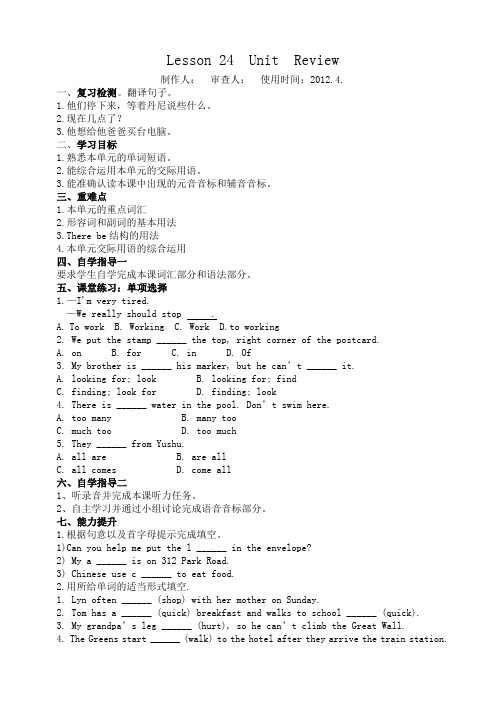
Lesson 24 Unit Review制作人:审查人:使用时间:2012.4.一、复习检测。
翻译句子。
1.他们停下来,等着丹尼说些什么。
2.现在几点了?3.他想给他爸爸买台电脑。
二、学习目标1.熟悉本单元的单词短语。
2.能综合运用本单元的交际用语。
3.能准确认读本课中出现的元音音标和辅音音标。
三、重难点1.本单元的重点词汇2.形容词和副词的基本用法3.There be结构的用法4.本单元交际用语的综合运用四、自学指导一要求学生自学完成本课词汇部分和语法部分。
五、课堂练习:单项选择1.—I'm very tired.—We really should stop .A.To workB. WorkingC. WorkD.to working2. We put the stamp ______ the top, right corner of the postcard.A. onB. forC. inD. Of3. My brother is ______ his marker, but he can’t ______ it.A. looking for; lookB. looking for; findC. finding; look forD. finding; look4. There is ______ water in the pool. Don’t swim here.A. too manyB. many tooC. much tooD. too much5. They ______ from Yushu.A. all areB. are allC. all comesD. come all六、自学指导二1、听录音并完成本课听力任务。
2、自主学习并通过小组讨论完成语音音标部分。
七、能力提升1.根据句意以及首字母提示完成填空。
1)Can you help me put the l ______ in the envelope?2) My a ______ is on 312 Park Road.3) Chinese use c ______ to eat food.2.用所给单词的适当形式填空.1. Lyn often ______ (shop) with her mother on Sunday.2. Tom has a ______ (quick) breakfast and walks to school ______ (quick).3. My grandpa’s leg ______ (hurt), so he can’t climb the Great Wall.4. The Greens start ______ (walk) to the hotel after they arrive the train station.5. Look! Danny ______ (have) a panda in his hands.八、当堂小结1.学生自己总结本课知识点,强调学生相互补充。
冀教版-英语-七上-导学案第24课
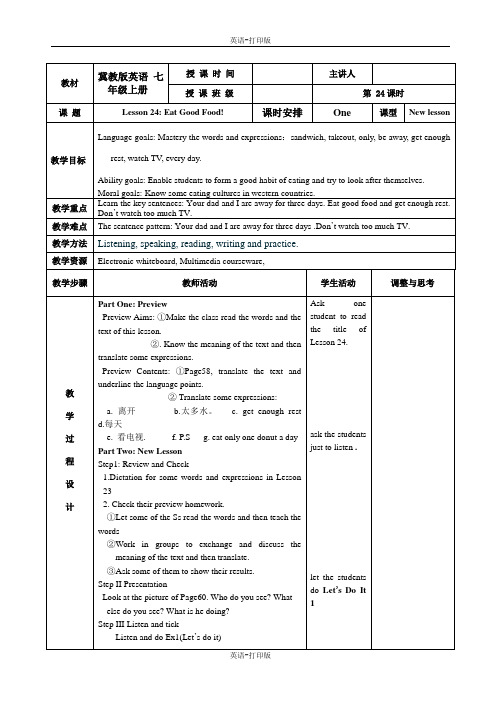
let the students doLet’s DoIt2/3
Work in pairs.Let’s Do It4
Ask some students to finish the exercise
作 业
a.Finish your list of Tips for Good health .Try to write at least 5 sentences.
2. Check their preview homework.
①Let some of the Ss read the words and then teach thewords
②Work in groups to exchange and discuss the meaning of the text andthen translate.
b.PreviewUnit Review(Unit 4)and finish thepreviewhomework..(page64)
板
书
设
计
Lesson 20: I Like the Supermarket!
1. New words:sandwich, takeout, only,
2. Sentences:
c. What do they leave in the fridge?
d. What should he drink every day?
Step VDig in
Work with a partner to fill the blanks in Dig in.
Step VIPractice
1. Workin groups and finishLet’s Do I t!Ex4.
冀教版七年级下册英语 Lesson 24 教案(教学设计)

Unit 4 After-School ActivitiesLesson 24 How Was Your Weekend?单词everybody, weekend, myself, taught,了解周末活动,能够用英语写电子邮件。
正确使用本课的词和短语,分辨、会用everybody, weekend, myself, taught, delicious, camera, have a great/good weekend, take a bus,fresh home-made donuts, next weekend, climb a mountain, mountain climbing, play games。
Step 1.Lead inLeading in 【情景1】Teacher asks the students questions about how to spend a weekend.Ask students questions:“How was your weekend? Did you have a good weekend? What are you going to do next weekend?”S1:How was your weekend?S2:Great.S1:What did you do?S2:I climbed the mountains with my friends.Did you have a good weekend?S1:Yes,I did.I went to the park with my friends.S2:What did you do there?S1:We played games and flew kites.S2:What will you do next weekend?S1:I will go to help at the Old Age Home.What about you?S2:I will plant flowers in my garden.Leading in 【情景2】Group work:Ask the students to work in groups and discuss what they did last weekend.After a few minutes, ask some groups to make a report in front of the class.Group 1:Jim went to climb the mountains with his friends.They saw many kinds of flowers and trees on the mountains.They saw much water on the mountains.They took many pictures on the way.Kate and her friends went to help at the Old Age Home.They helped the old men clean the rooms.They had a party for the old men.The sang and danced.They had a good time with them.Step 2.Presentation1.Show the students objects or pictures and learn the new words and expressions in this part:everybody, weekend, myself, taught, delicious, camera, have a great/good weekend, take a bus,fresh home-made donuts, next weekend, climb a mountain, mountain climbing, play games.Show a picture to the students.Point to the picture and ask:T:Is everybody here today?S1:Yes.T:Very good.Now read after me “everybody”.S:Everybody.T:What are you going to do next weekend?S2:I am going to the museum.T:Now read after me “weekend”.S:Weekend.2.Ask the students to make sentences with the new words and phrases.S3:These are fresh home-made donuts.Would you like some?S4:Yes,please.Mm…They are delicious.What are you going to do next week?S5:I’m going to climb the mountain.S6:How will we go there?S7:Let’s take a bus.S8:We will take cameras with us.Give the students chances to make sentences or make up dialogues.Step 3.Practice1.Ask the students to retell the e-mail.2.Ask the students to write an e-mail about what they did last week and what they will do next weekend.Every group chooses the best to read in front of the class.When the students are writing, the teacher should walk around and give them advice.Step 4plete Let’s Do It!Exercise 1 is used to practice the students’listening.Let’s finish it in class.We have finished Exercise 2 in reading part in class.Ask the students to finish Exercise 3 in class.Teacher checks their answers in class.Step 5.TaskGroup work:Let’s Do It! Exercise 4.Work in groups.What did you do last weekend?What are you going to do next weekend? Interview your group members and fill in the table.Then present it to the class.After a few minutes, ask the students to make a report in front of the class.1.你们度过了一个愉快的周末吗?Did you?2.同学们上周过来,帮助老人们打扫房间。
Unit4Lesson24教学设计冀教版七年级英语上册
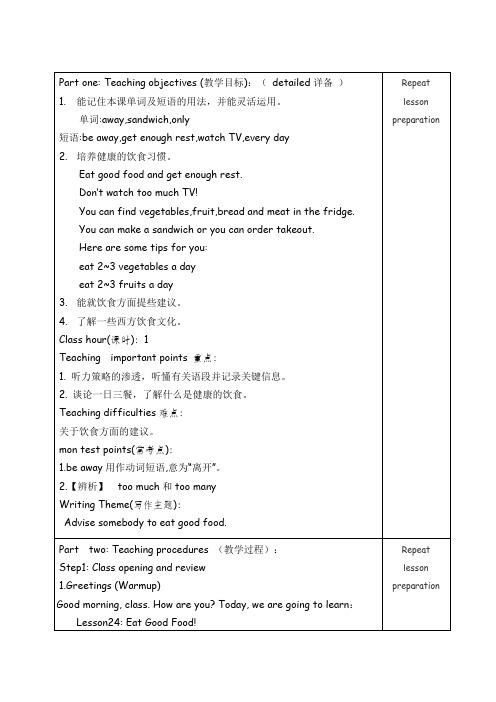
2.出示学习目标。
设计意图:使学生做到有的放矢。
3.ReviewThe main words and phrases of lesson 23.4.Leadin①The teacher asks the students about their healthy eating habits.Ask the students to interview others about what they eat for breakfast,lunc h and supper.They write down the results in a table.S1:What do you have for breakfast every day?S2:I have bread and cereal.S1:What about you,XX?S3:I have pancakes and vegetables.S1:What do you usually have for lunch?S2:I have dumplings.S1:What about you,XX?S3:I have noodles.S1:What do you usually have for dinner?S2:I have hamburgers and milk.S1:What about you,XX?S3:I have chicken and soup.…Now the teacher shows several different tables to the students.Let them pare whose eating habit is the most healthy. [设计意图]通过采访,练习本单元句型,了解其他人的饮食习惯,引出对三餐表达建议的话题。
②Ask what we should eat every day.Ask the group members to write down their answers and show them to others.Discuss whether the eating habit is healthy or unhealthyS1:I eat beef and bread for breakfast.I eat noodles for lunch.I eat bread and milk for supper.S2:I eat vegetables and bread for breakfast.I eat chicken and riceDo you know what the short form means?p.s. postscriptUFO Unidentified flying objectDoc. doctormin. minuteNo. numberWHO World Health OrganizationWTO… World Trade Organization设计意图:拓展知识,开阔视野。
冀教版英语七年级下册 Lesson 24 How Was Your Weekend学案

Lesson24How Was Your Weekend学案学习目标:1.掌握本课重点单词、词组、句型。
学会2 .用英语表达自己的周末计划。
教学重难点,重点短语1 have a good /great weekend2 take a bus3 It’s three hours away from my house.清晰书写本课单词1.好吃的,美味的______________2.每人,人人______________熟读课文,翻译下列词组或句子1、你周末怎么样_____________________________________________________2、我渡过了一个愉快的周末__________________________________________3.詹妮过来帮助我们_________________________________________________4、它有很多工序,但很有趣___________________________________________5、下周末,我打算去爬山______________________________________________6、爬山是如此有趣____________________________________________________7、我们打算乘公共汽车去那里__________________________________________8、从我家到那三个小时________________________________________________9、我很兴奋_________________________________________________________10、我打算给每个人带一些面包圈_____________________________________11、你有一个愉快的周末吗__________________________________________11、下周末你打算做什么______________________________________________12、尽快回信_________________________________________________________知识点解析1、everybody pron. 每人;人人1)I am going to bring some donuts for_______________. 我将为每个人带一些面包圈。
2024年冀教版七年级英语下册教案Lesson 24 How Was Your Weekend?

Lesson24How was Your weekend?教学目标通过本课的学习,学生能够:1.掌握本课重点词汇everybody、have a great/good weekend、take a bus等。
2.了解课文内容,体会一般过去时和一般将来时的用法,并用目标语言描述上周的活动和未来的计划;3.合理安排自己周末的学习、运动、休息、娱乐等活动,过有意义的周末。
语篇研读What:本课语篇是一篇电子邮件,信中Danny向李明介绍自己上周学做面包圈以及下周要和家人一起去爬山的事情。
Why:讲述Danny上周制作面包圈以及下周要去爬山的故事,让学生体会一般过去时和一般将来时的用法,对比两者的区别,同时能够介绍自己上周所做的事情及下周的打算,锻炼学生的语言运用能力。
How:语篇采用分段讲述的形式,语篇结构清晰。
第一段是日常问候,第二段讲述上周Danny和Jenny一起制作面包圈以及他的感受,第三段讲述了Danny下周要去爬山,第四段询问李明上周末的情况和下周末的安排。
教学过程设计理念:以《英语课程标准》核心素养为导向,以单元主题为引领,基于语篇的育人理念,体现《英语课程标准》“学思用创”的英语学习活动观和“教—学—评”一体化设计理念。
教学目标学习活动效果评价Lead-in通过图片导入本课主题1.Greeting.2.Free talk.Ask the students to work in pairsand talk about the questions afterthe examples on the PPT.What did you do last weekend?What are you going to do next教师观察学生表现,根据学生的表现预判学生的能力并了解学生的兴趣,根据学生的回答情况给予帮助和鼓励weekend?设计意图导入本课主题,激发学生兴趣的同时学习新单词Activity1:Listening 通过听力,学生对文本内容有大概了解Finish Exercise1on page61—Listen and match the pictureswith the questions.观察学生是否有准确获取信息的能力,并给出指导设计意图通过听力提取Danny周末的活动信息,并在听力中使用抓取关键词、速记等策略完成听力任务【学习理解】续表教学目标学习活动效果评价Activity2:Reading 通过细节阅读,学生对文本内容进行深度解析Read the text and finish theexercises on the PPT.Then checkanswers in class.Discuss ifnecessary.教师观察学生能否快速完成相关的问题,并根据学生完成情况来判断并引导学生进行更多的阅读技巧的训练设计意图细读文章,使学生整体把握对话的中心意思,提高学生归纳和整理信息的能力,以及运用语言的能力【学习理解】Activity3:Retell thestory根据所给单词和提示复述文章内容Fill in the blanks on the PPT andretell the story with the help of it.观察学生是否能准确获取并理解文章的细节,能否在有限的时间内完成相关任务环节,能否完整地、顺利地进行语言输出设计意图通过复述,学生能够整体把握文章思路,深刻理解主题,整体使用语言素材。
24七年级上英语导学案
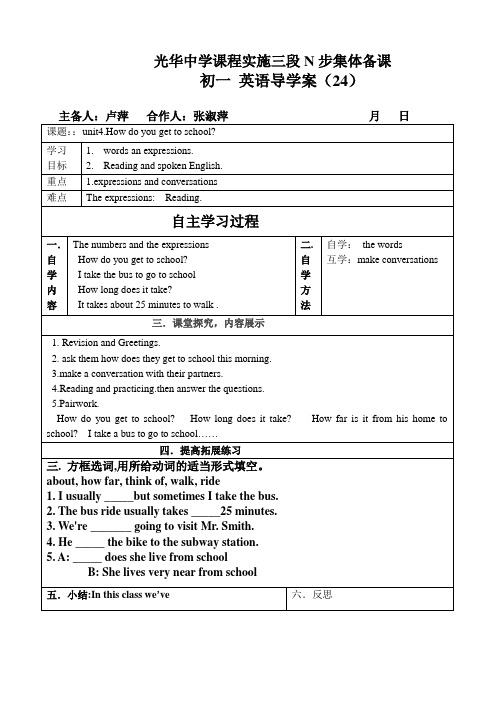
5.Pairwork.
How do you get to school? How long does it take? How far is it from his home to school? I take a bus to go to school……
四.提高拓展练习
三.方框选词,用所给动词的适当形式填空。
about, how far, think of, walk, ride
1. I usually _____but sometimes I take the bus.
2. The bus ride usually takes _____25 minutes.
五.小结:In this class we’ve
六.反思
光华中学课程实施三段N步集体备课
初一英语导学案(24)
主备人:卢萍合作人:张淑萍月日
课题::unit4.How do you get to school?
学习
目标
1.words an expressions.
2.Reading and spoken English.
重点
1.expressions and conversations
3. We're _______ going to visit Mr. Smith.
4. He _____ the bike to the subway station.
5. A: _____ does she live from school
B: She lives very near from school
冀教版七年级英语上册Lesson24导学案
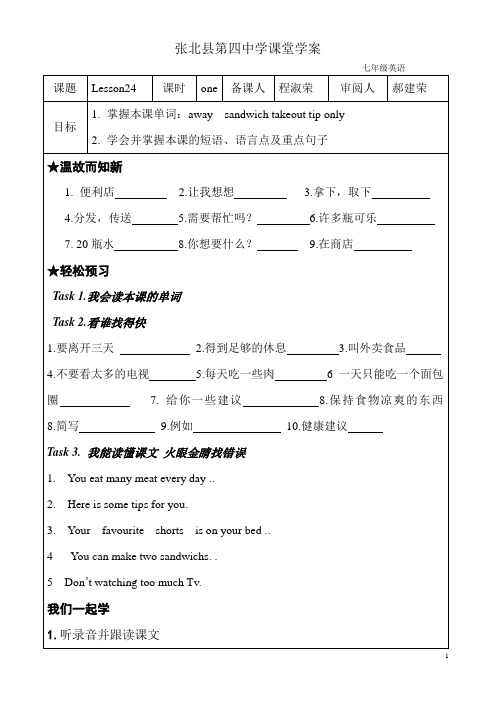
Too much修饰不可数名词或放在动词的后面
你工作干得太多了You work.
不要吃太多肉Don’t eat.
too many修饰可数名词much too修饰形容词或副词 too cold too much rain too much snow
4 .watch观看还可做名词,意思是手表,复数是watches常见搭配
watch Tv watch a movie搭配watch a football match
5. Tv is short for television ..翻译
be short for ……简写
三.根据提示完成句子。
1. It is oa cat.
2. They are afor two days . .
3. Bike is sfor bicycle. .
4. My mother isn’t in. I have to otakeout.
5. Jack is(足够大)to go to school.
我们一起学
1.听录音并跟读课文
2.大声读共同找
1.你爸爸和我离开三天??
be away离开,不在Hefrom home .他不在家
2.吃好,得到充足的休息
enough修饰名词放在名词的前面,修饰形容词,副词放在形容词副词后
用下面的词和enough组成词组
takeout funny medicine sandwiches scared pretty colourful
1. You eat many meat every day ..
2. Here is some tips for you.
3. Your favourite shorts is on your bed ..
七年级英语上册lesson24eatgoodfood导学案(新版)冀教版
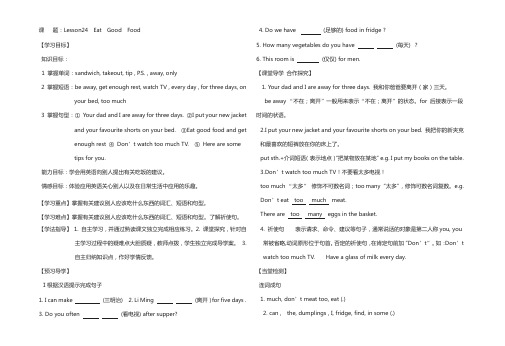
课题:Lesson24 Eat Good Food【学习目标】知识目标:1 掌握单词:sandwich, takeout, tip , P.S. , away, only2 掌握短语:be away, get enough rest, watch TV , every day , for three days, on yourbed, too much3 掌握句型:①Your dad and I are away for three days. ②I put your new jacket andyour favourite shorts on your bed. ③Eat good food and get enoughrest ④Don’t watch too much TV. ⑤Here are some tips for you. 能力目标:学会用英语向别人提出有关吃饭的建议。
情感目标:体验应用英语关心别人以及在日常生活中应用的乐趣。
【学习重点】掌握有关建议别人应该吃什么东西的词汇、短语和句型。
【学习难点】掌握有关建议别人应该吃什么东西的词汇、短语和句型。
了解祈使句。
【学法指导】1. 自主学习,并通过熟读课文独立完成相应练习。
2. 课堂探究,针对自主学习过程中的疑难点大胆质疑,教师点拨,学生独立完成导学案。
3.自主归纳知识点,作好学情反馈。
【预习导学】Ⅰ根据汉语提示完成句子1. I can make (三明治)2. Li Ming (离开)for five days .3. Do you often (看电视) after supper?4. Do we have (足够的) food in fridge ?5. How many vegetables do you have (每天) ?6. This room is (仅仅) for men.【课堂导学合作探究】1. Your dad and I are away for three days. 我和你爸爸要离开(家)三天。
甘肃省白银市强湾中学七年级英语上册导学案24

甘肃省白银市强湾中学七年级英语上册导学案24第 2 页第 3 页课题Lesson 24 单元复习课时1课时课型新授学习目标1 学会表达感觉.2 学会看病的用语.3 学会表达身高.语法: 1 陈述与疑问 2have(has)的用法重点句型: How do you feel? I feel/ am ……How tall are you ?What’ the matter?My ()hurts流程Ha重难点1陈述与疑问2 have(has)的用法How do you feel? I feel/ am ……How tall are you ?What’ the matter?My ()hurts教师活动(环节、措施)学生活动(自主参与、合作探究、展示交流)复习导学1 学会表达感觉.2 学会看病的用语.3 学会表达身高.语法: 1 陈述与回答 2have(has)的用法重点句型: How do you feel? I feel/ am ……How tall are you ?What’ the matter?My ()hurts语法:1 仔细阅读P-101页陈述与疑问2have(has)的用法第 4 页教师活动(环节、措施)学生活动(自主参与、合作探究、展示交流)教师活动(环节、措施)学生活动(自主参与、合作探究、展示交流)John liked to keep his hair very long. Some of his friendsthought that it looked like girl’s hair, but they never madejokes about it, because John was a big strong, strong youngman and he doesn’t like jokes about his funny hair.John always went to the barber’s twice a month to havehis hair cut and washed, and one day the barber said tohim, “Now why don’t you let me cut most of this hair offand give you a new hairstyle? Nobody would recognize youif I did that, I’m sure.” John said nothing for a second, andthen said, “Perhaps you are right but I’m not sure thatnobody would recognize you too if you did that to my hair.”( ) 1. John kept his hair long because ______.A. John is a girlB. the barber wouldn’tlike to cut his hair short.C. John likes it to be longD. that hair grew too fast( ) 2. His friends never made jokes about the hairbecause _______.A. the hair wasn’t funnyB. John liked his hair verymuch C. John was a shy man.D. John didn’t like jokes about his hair and they wereafraid of him.( ) 3. A barber is a ______.A. shop where one’s hair can be washed and cutB.man who has his hair cutC. person who cuts men’s hairD. doctor who givesheadache treatments( ) 4. The barber advises(建议)John _____.A. to have his hair cut shortB. to cut off most of hishairC. to keep his hair longD. to wash his hair( ) 5. How often did John go to the barber’s?A. Every weekB. Twice a weekC. Every monthD. Twice a month写作文:使用所学过的句型及单词,描述一位你熟悉的人。
七年级英语导学案 No.24 Unit4 Period1
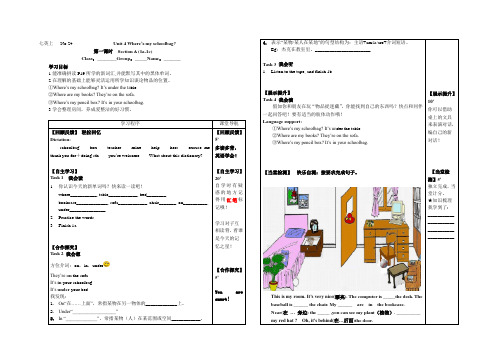
多读多背,
英语学会!
【自主学习】20’
自学时有疑惑的地方记得用红笔标记哦!
学习对子互相读背,看谁是今天的记忆之星!
【合作探究】5’
Youare smart!
【展示提升】10’
你可以借助桌上的文具来表演对话,编自己的新对话!
【当堂检测】5’
独立完成,当堂计分。
★知识梳理
我学到了:
___________
1.Listen to the tape, and finish 1b.
【展示提升】
Task4我会演
假如你和朋友在玩“物品捉迷藏”,你能找到自己的东西吗?快点和同伴一起问答吧!要有适当的肢体动作哦!
Language support:
①Where’s my schoolbag? It’s under the table.
学习程序
课堂导航
【回顾反馈】轻松回忆
Dictation:
schoolbagbox teacher mine help hers excuse me thank you for+doing sth you’re welcome What about this dictionary?
【自主学习】
Task 1我会读
①Where’s my schoolbag? It’s under the table.
②Where are my books? They’re on the sofa.
③Where’s my pencil box? It’s in your schoolbag.
3.学会整理房间,养成爱整洁的好习惯。
1.你认识今天的新单词吗?快来读一读吧!
where___________, table____________, bed________, bookcase_____________, sofa____________, chair_______, on__________, under_______________.
初中七年级英语教案Lesson 24 How Was Your W…得奖
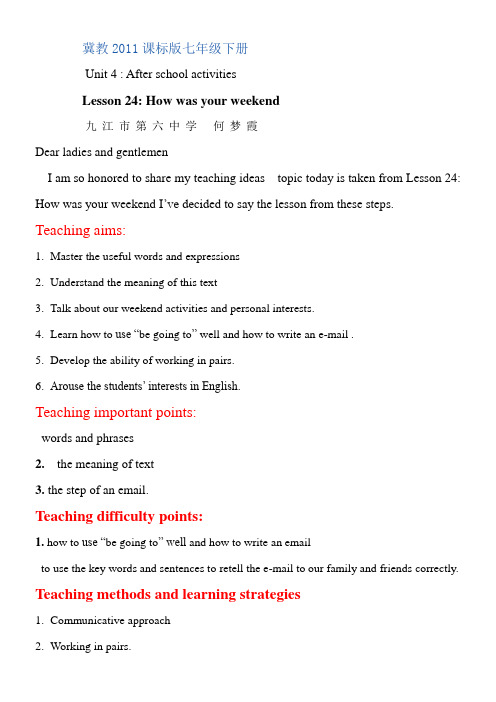
冀教2011课标版七年级下册Unit 4 : After school activitiesLesson 24: How was your weekend九江市第六中学何梦霞Dear ladies and gentlemenI am so honored to share my teaching ideas topic today is taken from Lesson 24: How was your weekend I’ve decid ed to say the lesson from these steps. Teaching aims:1.Master the useful words and expressions2.Understand the meaning of this text3.Talk about our weekend activities and personal interests.4.Learn how to use “be going to” well and how to write an e-mail .5.Develop the ability of working in pairs.6.Arouse the students’ interests in English.Teaching important points:words and phrases2. the meaning of text3. the step of an email.Teaching difficulty points:1. how to use “be going to” well and how to write an emailto use the key words and sentences to retell the e-mail to our family and friends correctly. Teaching methods and learning strategiesmunicative approach2.Working in pairs.3. Task-based language teachingTeaching aids:a traditional blackboard, a tape recorder ,the multimediarelatedmaterials like pictures ,cardsTeaching plan: 9 stepsTeaching procedures:Step1 Lead-inAfter greeting friendly the whole class in everyday English, we can come to the first step: lead-in.First of all , I divide all the students into 5 groups, let them have a pk. Then we sing and dance together an English song called “what do you like to do”. It makes us relaxed and closed to our today`s topic “how was your weekend”This time I ask the students to guess what I like to do in my free time. Encourage most of the students to describe their own weekends by themselves in English According to my answers. It can help students to review the past knowledge,at the same time, tell them clearly our next tasks in this class. Step2:Free talkShow a list of pictures about myself and my children on the blackboard. Ask students to talk about the activities.T: Boys and girls , what other kinds of interesting work can we students do I’ll show you some pictures. Find your partner and make new conversations each other.Help the students to master the grammar. Put up some grammar on the blackboard. The purpose of my design is to attract students` attention to this class and use correct tense to make sentences. In fact, students in my class did show great interest in this part and remembered the words in a very short time. The smile on their faces proved it.Step3:learn new lessonAsk the students to open their books and turn to page24 .reading and know the general ideas about this e-mail ,find these three questions`answers and write them on the paper sheet ,at last check the answers together.2. careful reading with 5questionsI advise two students every group to discuss the importance and difficulties about these questions. underline or circle some key sentences that you don`t understand .At the same time, pronunciation is also very importantall check these questions together carefully and make some special examples about difficult phrases and grammar for the students` understanding well.and readingListen to the tape quietly and read loudly after this .After practicing a while ,two students and I read this e-mail emotionally in front of the classroom. Let students feel the charming of English and love deeply to learn well language. Because as we know the interest is the best teacher.The purpose of my design is to give students a whole understanding about this e-mail, make sure everyone can read it fluently. Make a preparation for retelling it well.Step4: retellI tell this email in my own words to all the students after studying this lesson .The best way we study---share our knowledge and feelings to others in time. Then encourage them to retell today` English to their parents and good friends by this mind—map on the blackboard. I want to set up a positive value for them. Because it is a virtue and healthy for us to share our happiness and sadness by using new sentences and grammar as more aspossible.Step5:structures of an e-mail or a postcardAfter learning something about this email, Discuss what an email is how to write a complete e-mail correctly . (a good head , a good body, a wonderful tail). I read an e-mail I write to my friend Danny for all students. This can help students to improve their mastering of the difficulty points.Step7: play a gameEveryone has different interesting things to do after classes. This weekend is coming in two days .What are you going to do Who are you going to go Where are you going to go......... Now every group can choose one theme from the blackboard and discuss with the other 5 students in the same group. We are going to look for the best two groups to show themselves for us .these all students can get a gift. Good Luck The purpose of my design is to strengthen the target language and deepen the essence of Chinese students` spoken English and make study enjoyable.step8:make a summary1:listen to a foreign student`s weekend plans and their real activities by some different kinds of beautiful pictures.2:let students close books and think it over what we have learnt in this lesson. Dothey have any difficulties and questions They can hands up if they have.3: Do anything is possible if we work hard! Where is a will, there is a way.Step9:Homeworkoff the exercises .to write more e-mails to your good friends and family3. preview our tomorrow`s lesson一.Fast reading E-mail quickly then answer these 3questions.wrote this E-maildid Danny do last weekendis Danny going to next weekend二. Careful reading Read the E-mail carefully then answer these 5 questions.taught Danny to make donuts2. What does Danny think of home-made donuts3. How is Danny going to the mountain4. How long is it going to take from Danny’s house to the mountain5. What is Danny going to bring for everybody。
2023年冀教版七年级英语下册Lesson 24 How was your weekend导学案
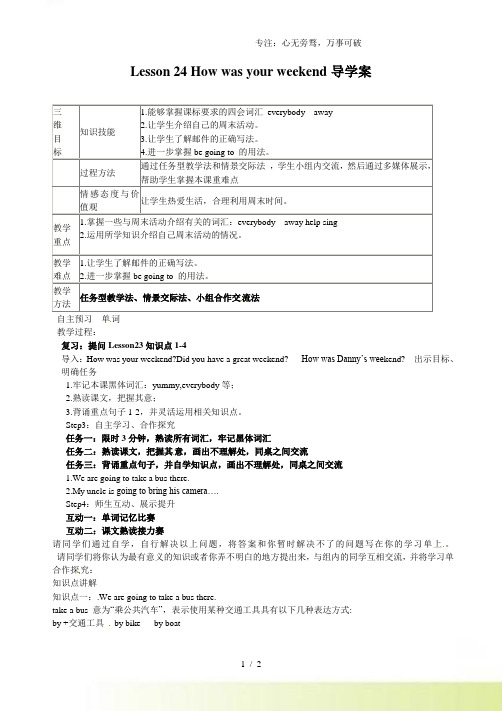
Lesson 24 How was your weekend 导学案自主预习---单词教学过程:复习:提问Lesson23知识点1-4导入:How was your weekend?Did you have a great weekend? How was Danny’s wee kend? 出示目标、 明确任务1.牢记本课黑体词汇:yummy,everybody 等;2.熟读课文,把握其意;3.背诵重点句子1-2,并灵活运用相关知识点。
Step3:自主学习、合作探究任务一:限时3分钟,熟读所有词汇,牢记黑体词汇任务二:熟读课文,把握其意,画出不理解处,同桌之间交流任务三:背诵重点句子,并自学知识点,画出不理解处,同桌之间交流1.We are going to take a bus there.2.My uncle is going to bring his camera….Step4:师生互动、展示提升互动一:单词记忆比赛互动二:课文熟读接力赛请同学们通过自学,自行解决以上问题,将答案和你暂时解决不了的问题写在你的学习单上。
请同学们将你认为最有意义的知识或者你弄不明白的地方提出来,与组内的同学互相交流,并将学习单 合作探究:知识点讲解知识点一:.We are going to take a bus there.take a bus 意为“乘公共汽车”,表示使用某种交通工具具有以下几种表达方式:by +交通工具 by bike by boat三维目标知识技能 1.能够掌握课标要求的四会词汇 everybody away 2.让学生介绍自己的周末活动。
3.让学生了解邮件的正确写法。
4.进一步掌握be going to 的用法。
过程方法 通过任务型教学法和情景交际法 ,学生小组内交流,然后通过多媒体展示,帮助学生掌握本课重难点 情感态度与价值观让学生热爱生活,合理利用周末时间。
教学 重点 1.掌握一些与周末活动介绍有关的词汇:everybody away help sing 2.运用所学知识介绍自己周末活动的情况。
- 1、下载文档前请自行甄别文档内容的完整性,平台不提供额外的编辑、内容补充、找答案等附加服务。
- 2、"仅部分预览"的文档,不可在线预览部分如存在完整性等问题,可反馈申请退款(可完整预览的文档不适用该条件!)。
- 3、如文档侵犯您的权益,请联系客服反馈,我们会尽快为您处理(人工客服工作时间:9:00-18:30)。
灵宝故县一中2015—2016学年度上期七年级英语学案
Unit 2 Topic 3 Section D
主备人:李瑾使用人: ________
一、学习目标:
1. 复习物主代词及名词所有格。
2.复习描述人的个人信息,及“Whose”引导的疑问句。
二、学习重点: 1.会读会写下列单词:
(1)找到(2)警察(3)我们(宾格)(4)他(宾格)
2.把下列句子译成英语:
①这个男人来自加拿大,他穿着黑色的衣服。
②请帮我们找到他
③这是谁的尺子?我认为他是简的。
④这些是谁的铅笔,他们是我的。
三学习过程
Step 1: Free Talk(5分钟)内容描述两个人的长相、外貌。
Step 2: 看图问答(名词性物主代词的用法)(5分钟)
Step 3: 看图描述人物外貌(5分钟)
Step 4: 完成Grammar and Functions(3分钟)
Step 5:1.读Part 2 画出描述人物外貌的词 2.填表
3..教师点拨Please help us find him 请帮我们找到他,
help sb.(to)do sth.帮助某人做某事。
4.背课文
Step 6: Part 1 Listen and match(2分钟)
四、堂清(8分钟)
一)用所给单词的正确形式填空:
1.This is not .look, is new.(I)
2.A:Are these pens?(you)
B:No,they are not (We).They are (they)
3.A: Whose shirt is this? B:I think it′s (Han Mei)
4.I have a pet(宠物)cat. name is Mimi(It)
5.I have a friend. name is Wang Mei. is from shangdong(she)
6.Please help us find (he)
二)选用所给的词补全对话(注意大小写)
Here his are mine clothes where′s here′s thanks Jim′s 修改与补充:Mr.Wang: I have some colthes here. 1 are they? Look! 2 a blue jacket.
Is it yours Li Xiang?
Li Xiang: No, it′s not 3 .I think it′s 4 .
Mr.Wang: Hi, Jim .Is this jacket yours?
Jim : Yes ,it is Mr.Wang
Mr.Wang: 5 you are.
Jim : Thank you.
Mr.Wang: Next(下一个).Whose sweater(运动衫)is this?
Jiang Ling: It′s mine ,Mr.Wang.
Mr.Wang: Here you are.
Jiang Ling: Thank you Mr.Wang
Mr.Wang: 6 these your shoes. Wang Jun?
Wang Jun: No, I think they are 7 Mr.Wang: Liu Bo′s
Mr.Wang: Boys and girls. You must look after(照看)your 8 .Oh! 9 my
cap?
Jiang Ling: Here it is , Mr.Wang.
Mr.Wang: 10 , Jiang Ling.
1. 2. 3. 4. 5. 6. 7. 8.
9. 10.
三)情景对话。
1.—Is that coat ? —No, it′s not mine.
2.— mom is that teacher? —She is Li Lei′s mom
3.—What does Steve ? —He is short and he has blond hair.
4.—Whose bikes are those? —They are bikes. They are theirs.
5.—Please help us find the thief(小偷) —What does he look like?
—He has gray hair. He is green.
6.写出下列单词的复数形式:
①year ②look ③ apple ④toy ⑤baby
⑥this ⑦that ⑧it ⑨cloth ⑩boy
○11him ○12I ○13Her
教学反思:。
